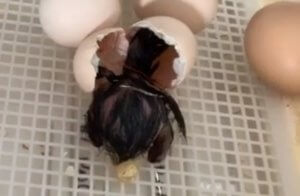
These First Century Days
Well, it’s Week 8 of our Stay at Home orders. And while we’ve learned new skills — we’re hand-washing like a bunch of surgeons — for the most part, we are not doing new things. Instead, we’re figuring out safe ways to do the basic things: grocery shopping, communicating with friends and family, going to work and school, caring for our families and our homes, and staying close to God and to each other in prayer.
Sometimes figuring out safe ways to do the basic things means making and wearing cloth masks over our faces when we go out — to protect those around us. We can make them out of old, soft tea towels, worn clean T-shirts, or big linen napkins. They don’t have to be special-ordered or professionally made — homemade ones work just fine. Sometimes it means baking bread instead of going to the store to buy some. And sometimes it means getting your groceries delivered. Or getting up early to shop during senior hours.
Emmanuel Day School
 At Emmanuel Day School, we’ve figured out a safe way to teach our preschoolers. I’d be the first to agree that an online format is not ideal for early childhood education, but our teachers have done the very best we can with our resources. We meet with the kids every morning on Zoom for lessons on shapes, colors, numbers, seasons, and life cycles. We hatched eggs right here in our chapel last week, live on Zoom during morning meeting. We even had a Hatchcam up and running on our Facebook page, and you may be able to hear them cheeping now if you listen!
At Emmanuel Day School, we’ve figured out a safe way to teach our preschoolers. I’d be the first to agree that an online format is not ideal for early childhood education, but our teachers have done the very best we can with our resources. We meet with the kids every morning on Zoom for lessons on shapes, colors, numbers, seasons, and life cycles. We hatched eggs right here in our chapel last week, live on Zoom during morning meeting. We even had a Hatchcam up and running on our Facebook page, and you may be able to hear them cheeping now if you listen!
We’ve also learned how to use Zoom and Facebook Live in order to worship together safely. And now through Ellen’s help we can enjoy our Emmanuel bells ringing and have Raymond with us playing the piano. But even though these are amazing 21st century technological innovations, what we’re really doing here is simple: staying close to God and to each other in prayer.
Basic Things
The basic things we are doing in this 2020 Eastertide of the pandemic — caring for our families and our homes, and worshiping while reeling in a new reality — are exactly the same things that Jesus’ followers were doing in that first Eastertide after the resurrection. They were disoriented, frightened, and grieving for Jesus — their teacher and leader. Then they discovered the empty tomb and saw Jesus back among them as they shared bread. During that first Eastertide, Jesus’ followers were trying to figure out what came next, and how they were going to do the simple, basic things safely — how they were going to work, get food, care for their families, and stay close to each other and to God. Those practices became our way of being in Christian community — of living as the body of Christ.
Eastertide is the only time in the church year that we read the Acts of the Apostles instead of an Old Testament reading. And Acts, which is the story of what Jesus’ followers did right after that first Eastertide is all about where we find ourselves right now. Our lives now are like that first century life, in the first Eastertide following Jesus’ resurrection. We’re trying to make sense of what’s just happened. We’re grieving family and friends who have died or been affected by COVID. Our world has changed dramatically, and things don’t look like they did before. Our politics are tense, and there is criticism and division. All of our feelings are magnified, and we respond very differently to stress: those who were a little discouraged can become overwhelmed or even angry, and others can find a strength and inner calm in uncertain circumstances that they didn’t know they had in them. They can become heroes of servant leadership.
New Ministries
That’s why in the time of the Acts of the Apostles new ministries arose — feeding, healing, wonders, and miracles. We need to pay attention in these times to new ministry among us. Now is a time to notice if you, or those around you, are called to ministry or service in a new way. Step forward as a leader in this new world. We’re figuring out how to do all the basic, simplest tasks of living in a new way, much like the disciples did in the first century — when through their fear, and grief, and surprise, and joy, they saw the risen Christ. For them then and for us now, it’s disorienting. It’s confusing. It’s different from the way it was before. But it’s also liberating and new and life-giving.
In our reading today we start in the second chapter of Acts, after Jesus’ followers have been filled with the Holy Spirit at Pentecost: Those who had been baptized devoted themselves to the apostles’ teaching and fellowship, to the breaking of bread and the prayers. Do those words sound familiar to any of you? They’re the words of our baptismal covenant, the baseline of our faith. They come right after we affirm that we believe in God — Father, Son, and Holy Spirit. The very next question is: Will you continue in the apostles’ teaching and fellowship, in the breaking of bread, and in the prayers? And we respond, I will with God’s help. Continuing in the apostles’ teaching and fellowship, in the breaking of bread, and in the prayers is the very most basic — and important — promise we make as Christians, right after we say we are Christians.
So what does that mean in these next days as we start thinking and planning what church might look like when we are able to worship together again? I ask because this is a first-century opportunity we have now. We are like Jesus’ followers in those breathless days after the resurrection, when they were trying to figure out how to accomplish the essential business of living as followers of Jesus. They really weren’t thinking about whether Rite I or Rite II might get more people to church, or if they should worship in the nave or outdoors if the weather was nice. They were trying to figure out how to live — how to work, care for their families, and stay close to each other and to God. They were trying to figure out the most basic things about continuing in the apostles’ teaching and fellowship, in the breaking of bread, and in the prayers. For us, this will mean the practical considerations of starting with very small gatherings in the church live-streaming on Facebook. Later, we may be able to worship with larger groups, gathered outside on the lawn, six feet apart, while wearing face masks and following hand washing and sanitizing protocols.
BUT — in all of this, we also have the opportunity to follow our baptismal covenant with the imagination and creativity of Jesus’ first century followers — seeing new possibilities with fresh eyes. HOW shall we pray? What ministries will be life-giving and meaningful to us?
Here’s one example, although it may not be where our imagination in ministry ultimately leads us: Mahatma Gandhi said, To a hungry man, a piece of bread is the face of God. And many of our parishioners have found great meaning in volunteering at the MLK Community Center to provide food resources for those who need them. This very work is their prayer, and their fulfillment of the most important part of their baptismal covenant after believing in God. During these last months, Catherine Curtis has restarted the hydroponic unit in the gym downstairs in the church, which is not being used now for any other purpose. Please do look at the Emmanuel Facebook page to see the beautiful lettuces growing. The first harvest has been taken to the MLK Center to provide fresh produce to those who are hungry.
What if one of the ways we were church in this new Eastertide was to work together to grow more food in the hydroponic unit for those who are hungry? Is that the most efficient way to grow food? Most likely not. Are we experienced farmers? For the most part, no. Couldn’t we just give money to MLK Center to buy the food? Of course we could — and we should also do that.
BUT we could also pray together, with our hands, growing food for those who need it. And in doing that, we continue in the apostles’ teaching and fellowship, in the breaking of bread, and in the prayers — the most important part of our baptismal covenant after believing in God. We are walking right now in a new first century kind of possibility in our church, exploring new ways to do to the simplest, most important and essential things in our mid-pandemic world.
Imagination and Creativity
This is a time for imagination and creativity in the way that we approach our lives as Christians. How do we fulfill our baptismal covenant in this new world? In a wonderful essay exploring online eucharist — an absolutely fascinating subject for another day — writer Joshua Case observes that allowing our current reality to inform our worship will enlarge our sense of God, give us the opportunity to gain a fresh view of ourselves, and remind us how our theology of worship always lives in tension with the needs of our people in real time.
I think most of us are doing a lot of praying these days — and much of it with our hands. As we pray — here today together OR by kneading bread, watering the garden, caring for loved ones, checking in with those in our community we haven’t heard from recently, or making a face mask — spend some time imagining who we will be as church when we get together in person again. It doesn’t have to be fancy — it’s just our baptismal covenant — the simplest, most basic, and holiest thing of all: continuing in the apostles’ teaching and fellowship, in the breaking of bread, and in the prayers. Amen
